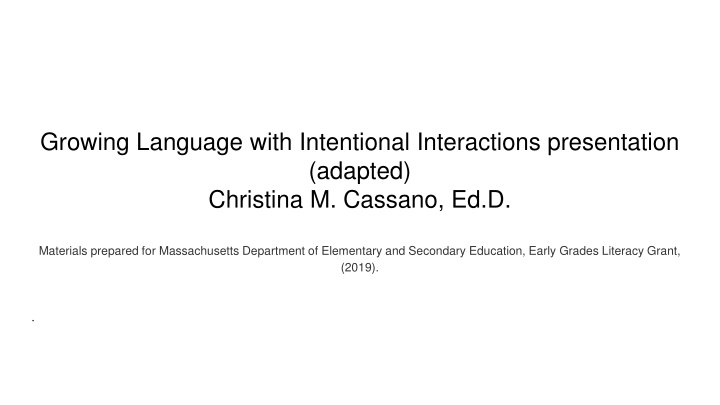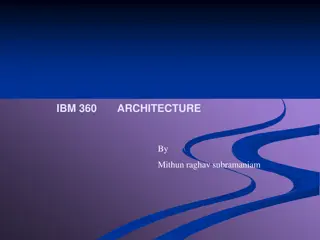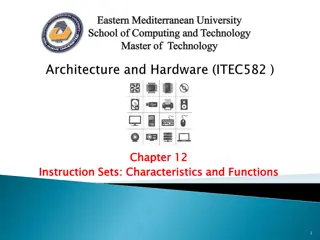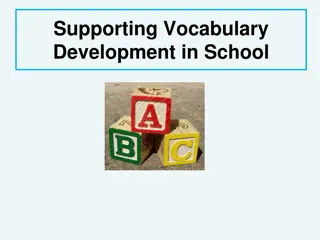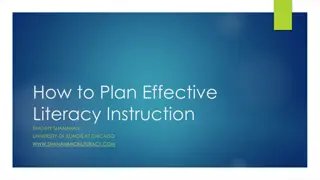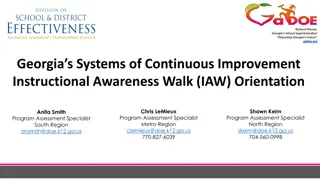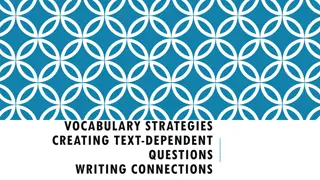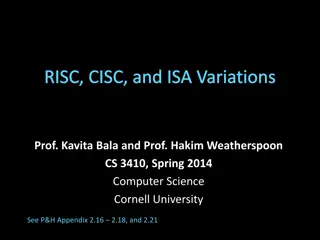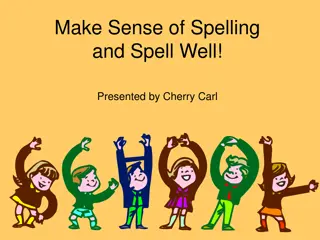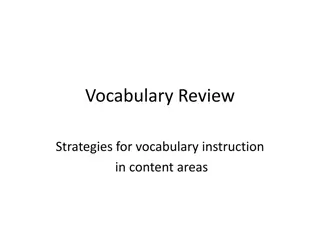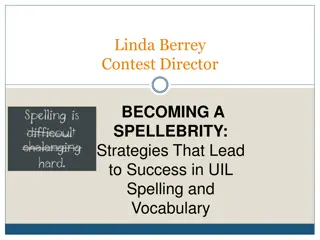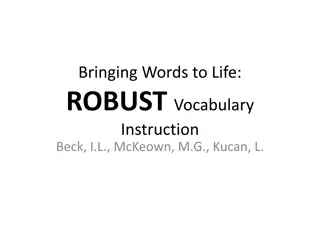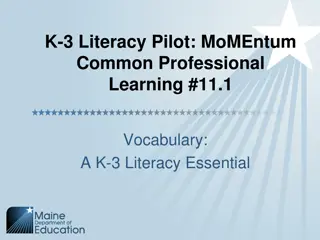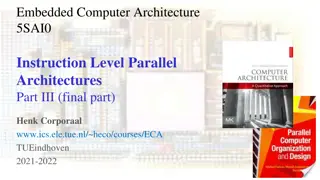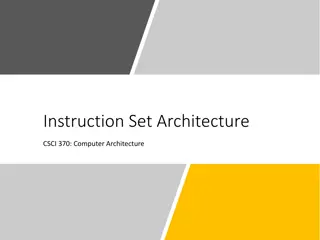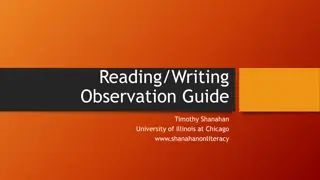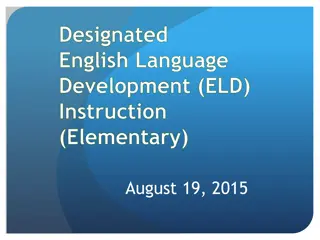Enhancing Vocabulary Instruction for Academic Success
Effective vocabulary development is crucial for academic success, particularly in early grades. This presentation emphasizes intentional interactions, research on vocabulary impact, strategies for supporting word learning, and the importance of both breadth and depth in academic vocabulary instruction. Providing concrete support and semantic assistance can significantly enhance vocabulary growth and comprehension skills, ultimately improving overall educational outcomes.
Download Presentation

Please find below an Image/Link to download the presentation.
The content on the website is provided AS IS for your information and personal use only. It may not be sold, licensed, or shared on other websites without obtaining consent from the author.If you encounter any issues during the download, it is possible that the publisher has removed the file from their server.
You are allowed to download the files provided on this website for personal or commercial use, subject to the condition that they are used lawfully. All files are the property of their respective owners.
The content on the website is provided AS IS for your information and personal use only. It may not be sold, licensed, or shared on other websites without obtaining consent from the author.
E N D
Presentation Transcript
Growing Language with Intentional Interactions presentation (adapted) Christina M. Cassano, Ed.D. Materials prepared for Massachusetts Department of Elementary and Secondary Education, Early Grades Literacy Grant, (2019).
Key messages ~ Reading and writing float on a sea of talk." ~ We learn language by using language. ~ Intentional interactions grow language. ~ Guarantee every child a voice!
A look at the research Vocabulary development Early vocabulary impacts later outcomes Is dependent on frequency and quality of input 75 to 88% of the children who struggle with reading in K-2 will continue to struggle throughout their school careers. Evidences variability early in development Is predictive of reading comprehension and recovery reading failure The improvers have higher levels of vocabulary (as well as phonological awareness and self regulation) compared to non improvers. Is essential for the success of EL students The importance of oral vocabulary increases with each grade level. Exhibits variable growth rates Is correlated with academic success Thus, low levels of vocabulary knowledge early on initiate a longer term chain of negative effects!
Supporting word learning and learning conversations Learning Conversations Strategies to support word learning Expose students to new words Actively engage students Offer opportunities to practice new words Extend understanding of known words Provide feedback Elicit talk Provide information about students vocabulary and conceptual knowledge (Collins, 2012) Semantic support Child friendly definitions/explanations, Rephrasing in your own words Physical support Gesturing, Using your voice, Acting out concepts or vocabulary through role play Concrete support Objects and illustrations, Media A note on controlled texts: Leveled texts have been specifically designed to have reduced vocabulary and comprehension demands. Thus they offer few opportunities to learn new words and concepts.
Dimensions of vocabulary and vocabulary instruction Breadth and depth of academic vocabulary are essential for reading comprehension and academic success. Depth knowledge is more predictive of later decoding and reading comprehension than is breadth. (NELP, 2008; Townsend et al., 2012). Unfortunately vocabulary instruction occurs rarely! When it occurs, the focus is on breadth of knowledge, not depth. (This issue is worse in schools serving economically disadvantaged children.) Evidence shows little improvement in the amount of vocabulary instruction even after professional development was provided! (Silverman & Crandell)
How to teach for breadth AND depth - immersion and flooding Immerse children in an array of language experiences so that they learn words through listening, speaking, reading, and writing. Flooding provides opportunities for: Listening Use frequent, rich, and extended language Model curiosity and interest in words Use word learning strategies Be precise and intentional! Children never learn words they do not hear. Ever! They must be immersed in or flooded with word- and world-learning opportunities. Speaking Offer extended discourse opportunities Scaffold, support, and extend children s language Foster word consciousness and knowledge seeking. Reading & writing across the content areas Use interactive read alouds Foster world and word consciousness
Children learn vocabulary by LISTENING when we: Use frequent, rich, and extended language! Target at least 10 words/week Provide meaningful information that extends beyond definitions Use repetition Consider multiple meanings Are intentional and precise! My purpose in teaching you this is... The big idea I want to think about is... Compared to yesterday, this Looking at this, I can infer...... Based on what I know, I can predict... If I choose to do this, then I will have to Model curiosity and interest in words! It says that crayfish have exoskeletons. Say exoskeletons. Isn t that a fun word to say? Exoskeleton. I looked exoskeleton up in a dictionary. It means they don t have bones inside their bodies like we do Embed word learning into teacher-talk! Animals that lay eggs are oviparous. Oviparous means having babies that hatch from eggs are not born alive like we are.
Children learn vocabulary by SPEAKING when we: Provide daily, extended discourse opportunities! Embed word learning strategies INTO the conversation. Elicit target words to support word learning. Point and call. Provide scaffolding during individual and group conversations! Scaffolding decontextualized language use Hinting Pumping Splicing Prompting Summarizing Expansion Provide explicit feedback that addresses children s (mis)understandings or (mis)application of word/world knowledge! Responsive Instructive Recursive Persistent Succinct
Children learn vocabulary by READING and WRITING across the content areas when we: Use interactive read alouds! Foster word and world consciousness! Promotes love of reading Explore content in depth Be a word detective and knowledge seeker! Expands children s word and world knowledge Familiarizes children with complex syntax & decontextualized language Use words across a variety of different contexts. Engage children in word games that deepen children s understanding of some words (e.g., I m thinking of a word ) Supports listening comprehension Provides anticipatory guidance
